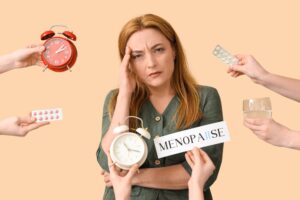 Author: Jenny Sinclair – marketing manager at Orajel
Author: Jenny Sinclair – marketing manager at Orajel

Menopause is finally receiving the awareness it rightly deserves within healthcare, notably within the oral health sector. From sensitive teeth to burning mouth syndrome, the fluctuation of hormone levels throughout menopause are being scientifically linked to dental implications. Despite knowledge and attention improving within the industry, many women still struggle in understanding their symptoms. Attempting to navigate these oral changes alone, women often seek support and relief without professional input, in frequently counterproductive methods.
Alike other systematic changes, dentists have a vital duty to support patients through the menopause. So commonly, the connection between menopause and oral health is missed due to lack of knowledge around the topic, meaning that those suffering are unaware of the connection between the two and suffering the discomfort alone. This only highlights the importance for clinicians to actively approach the matter, asking questions, identifying the signs, and offering evidence-supported assistance.
Common oral consequences of menopause
Menopause introduces huge hormonal changes and challenges, particularly regarding oral health, yet countless symptoms are mislabelled and misunderstood. Xerostomia, or dry mouth, is one of the most frequently reported problems.[i] Throughout menopause, oestrogen levels reduce. As oestrogen helps to regulate saliva production, the reduced salivary flow rate leads to symptoms including a much dryer mouth.[ii] The oral mucosa and salivary glands containing oestrogen receptors evidence the direct correlation between xerostomia and menopause.
Periodontal health is also challenged throughout menopause due to the oestrogen deficiency causing increased inflammation in gingival tissues.[iii] This causes patients to be more susceptible to periodontitis.[iv]
In postmenopausal individuals, burning mouth syndrome (BMS) is ubiquitous. Hormonal variations cause these symptoms which range between tingling sensations to persistent burning sensations within the mouth.[v] Furthermore, altered taste perception with reports of metallic and unpleasant tastes, hugely impacts both quality of life and nutrition for those experiencing menopause.[vi]
Not only are these symptoms extremely uncomfortable for the patient, but also cause greater problems in the long run for dentists and patients alike; the symptoms can lead to caries, mucosal irritation, ulcers, fungal infections, and more.[vii] These symptoms can develop both individually or simultaneously, and without the correct medical involvement and support, patients can often find themselves attempting to self-remedy without the correct knowledge to successfully do so.
Why patients require clinical guidance
With patients unaware and unguided, they are at huge risk of augmenting the severity of their symptoms, struggling with symptoms for longer than necessary, and causing greater damage to their livelihood through an already difficult period.[viii] According to studies, only 16.23% of women correctly associate symptoms like their bleeding gums with menopause.[ix]
These issues not only create detriment and complexity to the lives of the patients, but the job of the dental teams fixing the issues is too, complicated further. Patients might avoid proactively seeking dental advice and care throughout this experience for a plenitude of reasons. To begin with, many patients are unaware of the connection between menopause and oral health. Others might feel embarrassed, may see the issue as more medical than dental, or minimise their symptoms, continuing their lives painfully.
Offering proactive patient support
For example, a patient self-soothing dry mouth faces the threat of inadvertently causing mucosal irritation or raising their risk of tooth decay, by using things like acidic artificial saliva products rather than seeking dental expertise. They might also overuse mouthwash, unknowingly exacerbating problems like ulcers, due to not knowing the consequences of alcohol-based mouthwash and its ability to worsen oral mucosa.[x]
 Similarly, somebody suffering persistent burning or specific oral pains such as ulcers and toothache, might unknowingly worsen their experience. They may utilise home remedies such as salt rinses to ease these symptoms, which can in turn spiral into worse symptoms both relating to discomfort and long-term oral health alike. Rather, clinicians’ interventions could help avoid this entirely by recommending evidence and research-based solutions such as soothing icy drinks or topical anaesthetic like Orajel Mouth Gel, which contains 10% benzocaine for fast, localised pain relief. Orajel offers a fast-acting, temporary relief rather than detrimental consequences of treatments like essential oils and salt water.[xi][xii]
Similarly, somebody suffering persistent burning or specific oral pains such as ulcers and toothache, might unknowingly worsen their experience. They may utilise home remedies such as salt rinses to ease these symptoms, which can in turn spiral into worse symptoms both relating to discomfort and long-term oral health alike. Rather, clinicians’ interventions could help avoid this entirely by recommending evidence and research-based solutions such as soothing icy drinks or topical anaesthetic like Orajel Mouth Gel, which contains 10% benzocaine for fast, localised pain relief. Orajel offers a fast-acting, temporary relief rather than detrimental consequences of treatments like essential oils and salt water.[xi][xii]
Patients can apply a thin layer of the gel directly to the affected areas, offering them a chance to take personal, successful control of their suffering and anguish through this period of their lives. With the gel blocking the nerves’ pain signals for two hours, the topical gel offers drastic relief in under two minutes.
Women’s experience of the menopause is impacting their lives more than it should due to a lack of knowledge which clinicians can offer through sensitive inquisition, advice, and support. This highlights the importance of clinicians and dental teams demonstrating proactive support by asking target patients menopausal-specific questions. This creates a mutually beneficial outcome for the dental team and primarily, the patient.

For more information, and to see the full range of Orajel products, please visit https://www.orajelhcp.co.uk/
[i] Giri, P. and Shigli, K. (2015) ‘Oral manifestations of Menopause’, Journal of Basic and Clinical Reproductive Sciences, 4(1), p. 4. doi:10.4103/2278-960x.153514.
[ii] Bhat S. A study on evaluation of the effect of menopause on saliva and dental health J Adv Dent Res. 2010;1:33–5
[iii] Yakar N, Türedi A, Emingil G et al. (2021) Oral health and emotional well-being in premenopausal and postmenopausal women: a cross-sectional cohort study. BMC Womens Health; doi: 10.1186/s12905-021-01480-5.
[iv] Dutt, P., Chaudhary, S., & Kumar, P. (2013). Oral health and menopause: a comprehensive review on current knowledge and associated dental management. Annals of medical and health sciences research, 3(3), 320–323. https://doi.org/10.4103/2141-9248.117926
[v] 9.Lamey PJ, Lamb AB. Prospective study of aetiological factors in burning mouth syndrome. (1998) Br Med J (Clin Res Ed);296:1243–6. doi: 10.1136/bmj.296.6631.1243.
[vi] Dutt, P., Chaudhary, S., & Kumar, P. (2013). Oral health and menopause: a comprehensive review on current knowledge and associated dental management. Annals of medical
[vii] López-Jornet P, Camacho-Alonso F. (2010) Oral manifestations of menopause. J Maturitas.;65(2):135–140.
[viii] Bell J A, Garlick D, Stevens C. (2022)It’s time to talk about the M word. Br Dent J; 232: 15-17
[ix] Singh, M. and Jamwal, M. (2020) ‘Assessment of periodontal hygiene, health, and myths among menopausal and Postmenopausal Women Visiting Outpatient Department: A cross-sectional study’, QAI Journal for Healthcare Quality and Patient Safety, 2(1), p. 19. doi:10.4103/qaij.qaij_2_21
[x] Haq, M. W., Batool, M., Ahsan, S. H., & Qureshi, N. R. (2009). Alcohol use in mouthwash and possible oral health concerns. J Pak Med Assoc, 59(3), 186-90.
[xi] Orajel Dental Gel. Summary of Product Characteristics. Available at: https://www.medicines.org.uk/emc/product/1230/smpc Accessed: November 2024

















